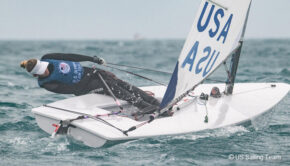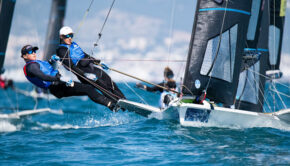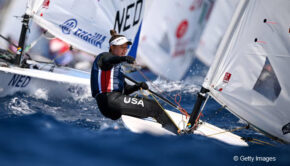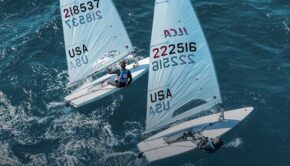Paving the Road for US Olympic Success
Published on February 15th, 2017
Two-time Olympic Champion and seven-time World Champion Malcolm Page (Sydney, Australia) has hit the ground running as the newly appointed US Chief of Olympic Sailing. After two months on the job, and with his young family now moved to the states, Scuttlebutt editor Craig Leweck checks in with Page for an update.
What is the role of the Chief of Olympic Sailing?
When the Olympic Sailing Committee went through the review process for the Rio 2016 quad, they found the range and amount of work for my predecessor to be excessive. The role was handling fundraising right through to the performance side of the sport, so with an interest to improve in all departments, my measurement point is now primarily on the performance side. I certainly will be involved with the fundraising group but it won’t be as big a chunk of the pie as it previously was.
Let’s talk about the performance side.
When it comes to the performance side, we’re going to be looking to grow that area, all in the aim of giving more opportunity to the athletes. It’s about giving them the right people to deliver on it. However, the first thing that’s got to happen is a shift towards a team culture focus. We need to improve together.
From a federation point of view, we’ve got to improve the skill of the athlete. We’ve got to make them better. But how do we do that? We get them the world’s best coaches and put them in charge. I’m a perfect example of that, of how Victor Kovalenko drove the Australian 470 program and pushed us forward. So that’s what we need in each of the classes. Rather than athlete-driven programs, we are looking to see the coach as the project manager because they’re the expert to drive that program.
Of course, we’ve got resource problems, so we’ve got to prioritize how we do that through performance and what’s going to be our best medal chances going forward for 2020, the near measurement point. But at the same time, we’ve got to keep our eye on the long term sustainability process of being able to reproduce this in 2024, 2028, so on.
And connecting with younger sailors is critical.
The Olympic Development Program is doing very well, but we can do so much more. We’re only just scratching the surface. When we get more time or resources, we can push that even further. We also need to learn how to best integrate into the college system. How can they use us, how can we use them to make sailing even bigger and better in this country. We need to develop the ultimate hierarchy.
What do you see as some of the advantages in the US that need to be maximized?
The talent, and the size of that pool of talent, is huge. We know in the sport of sailing that most Western countries do well because it’s a technical equipment-based sport. And USA, of all those countries, has the biggest potential with that.
Additionally, the amount of finance possible in this country is huge. While other Western countries have a lot of heavy government funding, which is something not possible here in the US, there remains both significant wealth within the public and commercial sectors. There is a big opportunity, but at the same time, we’ve got to have the right plan. You can’t just have that because you want it.
Lastly, the technology in the US is first class. There’s so much of it here in this country, so again we need to develop a plan to tap into, manage it, and use it for our sport to give us an unfair advantage [laughter].
And how does this get maximized?
The limitations have come with how athlete programs have been previously driven. This bottom-up principle saw the athletes doing their fundraising, doing their equipment development, designing their program and choosing their coach. That was obviously very hard for them, mostly because it’s very hard for them to know what to do. They’re starting at the Olympic level, in some ways, from the grassroots.
They needed a leader, or a program manager, or coach that’ll help them get there. But, also, if the Federation was able to gather that technical information, equipment information, over time, over many quads, they could then come along and hit the ground running. This is happening in the strong sailing nations, where in these programs, when a sailor gets involved in their class, they essentially get a package of guidelines of what is good and what is not good so they can come in at a higher level.
I sense this approach in the US only really got started during this past quad.
Yes, but it was also probably still driven heavily by the athlete. And to their right, they have funded it so why should they give this up? And you could say from some level that’s fair enough. But at the same time, we need a cultural shift. We need our athletes working together, and that happens when the federation is leading the program. That’s why I say we need program managers so we can guide the athletes in the right way. And then, also, we need that technology side of the sport to be able to get that unfair advantage.
The top programs seem to remain strong despite the retirement of their top sailors.
That’s the cultural shift that I’m talking about, where the sum of multiple people is always better than just one. If we can create this team environment, this top-down thinking, it’s going to help the athletes and overall program in the long run.
I see you have brought along one of your old mates to help.
The US men’s 470 team of Stu McNay and Dave Hughes just missed out on a medal in Rio and are in full pursuit of that medal for Tokyo 2020. They’ve previously won the Europeans and now have clearly set an objective to win a world’s medal this year. With the event only six months away, I saw they needed a new coach to be with them, to drive their program, challenge them, to skill them, and get them to a new level.
They’re a very good boat, but they’ve just missed at a world’s level and, of course, at the Olympic level. So how do we get that extra little half a knot of advantage? We brought in a new coach, Nathan Wilmot, to manage them and work with them for the next six months. The three of them are off to a good start having won at World Cup Series Miami.
And why Nathan?
For starters, he’s someone I know pretty well. Together we won five 470 World titles and the Gold medal at the Beijing 2008 Olympics. The other obvious advantage is that he comes with a lot of knowledge from the very successful Australian 470 program that will help skill these guys, give them an extra advantage.
When it comes back to the ‘program manage coaches’ that I’m talking about, they’ve got to be the world’s best. And even if it’s outside the US, let’s get them, learn from them, so we can also coach the coaches for that sustainability section that I also talked about for 2024. Get the quick gain for 2020, but then get some things in place for 2024, 2028, and so on.
What are the hurdles in the US that need to be minimized?
We need to overcome the ways things have always been done. I heard a quote recently, “We took 20 years to dig this hole, and it’s going to take us some time to get out.” And in many ways, that’s what’s happened. The US was so successful before the Olympic sport of sailing got more professional. However, the US didn’t adapt at the same rate as some other countries which now finds the US trailing.
The good news is that we see the direction forward, but it’s going to take some time to get the plan established and see the results. This started four years ago, so the pathway has been graded but still needs asphalt and guardrails. I suspect we will find our plan needs refining, maybe because of resources or unexpected issues. We will have our eyes wide open and will be honest and strong enough to fairly measure our progress and make changes when needed.
You refer to giving the sailors the best resources possible, but having the best sailors remains vital. Is the previous model of people beginning their Olympic campaign after a successful college sailing career broken?
Given what I have learned in the short time I have been here, I would agree that the previous model needs refining. This is one of the inhibitors of the modern day Olympic sport of sailing. But saying that, it also could be an advantage. There’s always two sides to the coin.
The school programs really teach the sailors to be athletes, to be professional. Tactically they’re growing as a sailor, and gaining critical skills on how to handle a boat around a start line. They’re gaining immense experience from that angle. But alternatively, they’re losing ground on their technical skills, on what makes a boat go fast, on how to deal with complications of campaigning, and all the other aspects that is required at the Olympic level.
So this is something we’ve got to amalgamate, how the college and Olympic programs can work together and possibly benefit from each other. But to your question, the Olympic program needs to work with the athletes earlier than has been previously done. We need to insure these athletes are better prepared when they decide to start their campaigns
This is the foundation of the Olympic Development Program that began in the previous quad. These teen sailors get to touch and feel what it’s like to mix with an Olympian or see what an Olympian goes through. Their campaign actually starts before they’ve started a campaign. Or they’re campaigning on a very lower level because they know it will take multiple quads.
Nobody is saying that an ideal Olympic program means to choose against education. Education remains hugely important, so it is about doing both and prioritizing accordingly. Olympic success requires maturity, so the school years allow for dabbling in Olympic boats to gain experience. This way, when they pop out the back end, they’re more prepared than before.
Success rarely comes in the first quad, so by starting earlier, I suspect the decision to commit to the second quad becomes easier.
Exactly, and because we’re showcasing that to the younger audience earlier, they’re going to have a better understanding of it.
Look at Jack Parkin and Wiley Rogers, who are now the reigning Youth World Champions. They’re a great example in how they already know what they want to do from an Olympics perspective. They’re both committed to school, but they also know that they’re going to be good medal candidates by 2024 because they’re dabbling in the Olympic world now.
Jack and Wiley are excelling in the I420 on an international level but are now also sailing the 470. They went to Rio as training partners for the US Women’s 470 team, so they’re understanding what the 470 is, which has helped them do their youth stuff. It’s going help them now to do their college racing, as well, long term.
They’re going into college thinking, “I’m coming to you to do my tertiary education, but I also want to do Olympic campaigning.” So now the colleges programs are starting to understand they’ve got to adjust to this new paradigm. They’ve actually got these immense athletes that are coming to them saying they want to do more than just school sailing. Yes, it will present complications, but it’s also a great selling point for the school. Working with these kids that may go on to win an Olympic medal will prove to be good marketing material for the school.
For young sailors now at the pram level, what would you say to that group? Is their success at that level indicative of what their success will be at the Olympic level?
There are two sides to that coin. Historically, those that have succeeded at the Olympic level also succeeded at the Youth World level, and sometimes also at Optimist international events. So yes, I guess it is an indication, but it’s certainly not the case for everybody. Let’s take myself as the other example as I completely skipped the Optimist years.
I grew up in a non-sailing family. My parents had never seen a sailboat in their life until my older brother came home from school one day and said, “I want to get a sailing boat and sail with my mate that I have at school.” That’s where it began for me, but there was no programs in Australia, certainly not at my age. I wasn’t even aware of the Youth World Championships until I was too old.
So I got into the Olympic campaign very late in my life, but it still worked out for me, when in many ways, I fumbled my way through the sport. I guess what it shows is people mature at different ages and different times because of different experiences and exposure along the way.
The fundamental thing for me is, if you love the sport and enjoy the sport, you will do your maximum regardless of how you got there. And we want to grow the sport, even from the US Sailing perspective. It’s one organization with two missions. US Sailing seeks to grow and support the sport and also manage the Olympic program, which is about performance and delivering of high-end results.
It’s a pretty cool thing about the sport of sailing. It’s all ages, all backgrounds, all levels of success that can mix together. We’d like to see both missions work together for the benefit of the entire scope of sailing in the US.









 We’ll keep your information safe.
We’ll keep your information safe.